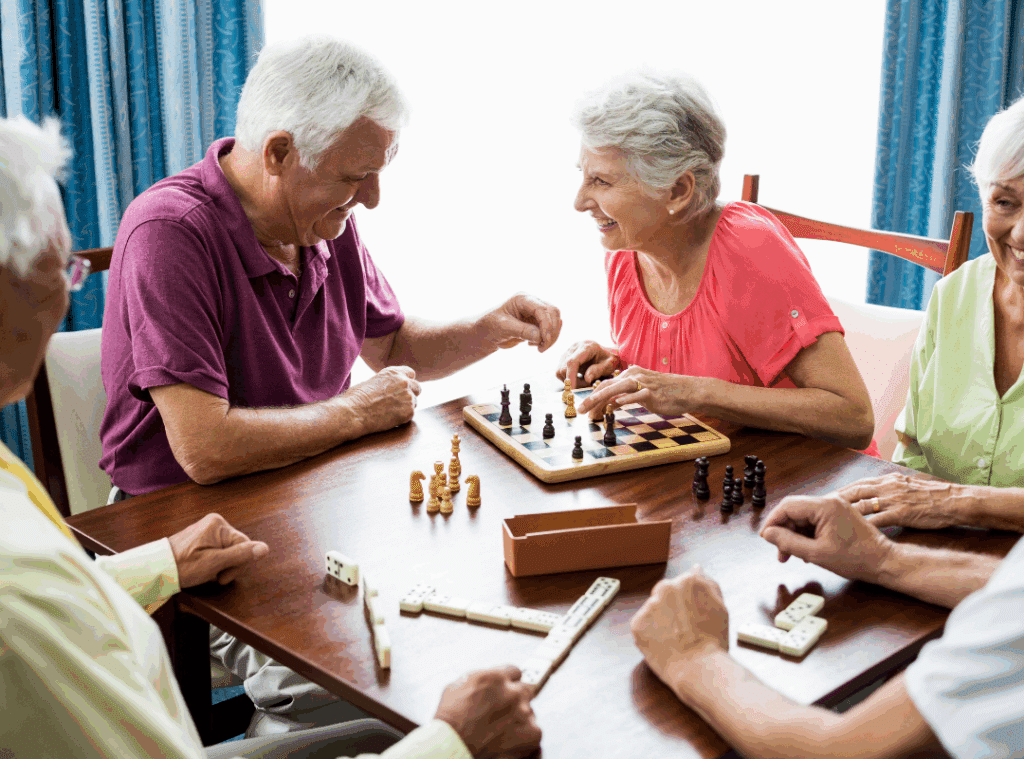Engaging in cognitive games for seniors is more than a leisure activity – it’s an essential part of keeping the brain active, sharp, and resilient. These mentally stimulating activities, from puzzles to interactive apps, can help improve memory, boost problem-solving skills, and even delay the onset of cognitive decline. Seniors who participate regularly in these games often experience better mental agility and an enhanced sense of accomplishment.
At Westmont of Fresno, we understand that the right mental exercises can make a world of difference. Whether you prefer classic puzzles, cognitive games for seniors online, or creative activities, these challenges keep the mind engaged while also offering opportunities for social interaction. By making brain health a daily priority, seniors can enjoy a higher quality of life and a greater sense of independence.
Benefits of Engaging in Cognitive Games
While you might think cognitive games for seniors are just a fun way to pass the time, they offer significant benefits for mental health and overall well-being. These activities stimulate neural pathways, improving cognitive function and mental agility. Options like brain games for seniors, free or group trivia sessions, also foster social connections, which can improve emotional health.
Regular participation in such games can help reduce the risk of depression and improve mood through engaging social interactions. According to the Alzheimer’s Association, stimulating mental activities can help slow cognitive decline in older adults (source). By embracing these games, seniors gain a valuable tool in maintaining their mental sharpness.
The Impact of Crossword Puzzles on Memory
How can a simple crossword puzzle make such a big difference? Research shows that solving crosswords stimulates the brain, enhancing cognitive flexibility and memory retention. Seniors who complete puzzles regularly may delay memory decline by up to 2.5 years.
Pairing crosswords with brain games for seniors, a free download with answers, offers even more variety and challenges. These downloadable games provide instant access to a range of puzzles that support memory retention while offering the satisfaction of problem-solving. Adding other activities like Sudoku challenges further diversifies the mental workout.
Enhancing Cognitive Function With Number Puzzles
Number puzzles, such as Sudoku, challenge logical thinking and pattern recognition. Studies show that seniors who engage in these activities regularly can boost their reasoning and problem-solving skills, potentially functioning mentally as if they were years younger.
Combining Sudoku with cognitive games for seniors with dementia can be especially beneficial, as the structure and repetition help provide a comforting yet stimulating environment. These activities not only improve brain function but also offer a sense of accomplishment, especially when shared with friends or family.
The Advantages of 3D Video Games for Seniors
3D video games can provide immersive environments that enhance spatial skills and memory. Unlike 2D games, 3D formats encourage navigation and strategy, improving mental agility and adaptability.
Integrating cognitive games for seniors online into daily routines ensures accessibility and variety. Many platforms now offer free or low-cost 3D games tailored to older adults, combining entertainment with brain training. Research from the American Psychological Association supports that video games can improve multitasking skills in seniors.
Enhanced Spatial Skills
Playing 3D games fosters cognitive flexibility and enhances spatial navigation. Seniors develop better orientation skills, which can assist in daily activities like navigating a new environment or remembering routes. These benefits extend beyond gameplay, contributing to greater independence.
Sustained Cognitive Improvement
Unlike quick puzzles, immersive games encourage extended engagement. This sustained focus strengthens recognition memory and boosts long-term mental resilience. Seniors who include these games alongside brain games for seniors maintain a dynamic mental routine that supports overall brain health.

The Role of Social Interaction in Cognitive Activities
Participating in cognitive activities within a group setting amplifies the benefits. Interaction with peers encourages motivation, reduces loneliness, and deepens learning through shared problem-solving.
Organizing group sessions for cognitive games for seniors with dementia can be particularly impactful, as they combine cognitive stimulation with emotional support. Activities like group trivia, collaborative puzzles, and shared storytelling help build a sense of community.
Exploring Creative Outlets: Arts and Crafts
Creative hobbies like painting, knitting, and card-making can significantly boost cognitive health. These activities improve fine motor skills, stimulate creativity, and reduce stress.
When paired with cognitive games for seniors online, arts and crafts provide a balanced mental workout. Seniors can alternate between creative expression and structured mental challenges, ensuring their brains stay both active and adaptable.
The Importance of Variety in Cognitive Engagement
A varied cognitive routine is key to maintaining mental agility. Mixing traditional games with digital tools, and individual activities with social ones keeps the brain challenged in different ways.
Here are three excellent categories to incorporate:
- Crossword and Number Puzzles – Enhance memory, logic, and problem-solving.
- Trivia Quizzes – Build knowledge and social connections.
- Language Learning Apps – Boost cognitive flexibility and communication skills.
Including brain games for seniors free download with answers and interactive apps ensures a wide range of stimulation, making cognitive workouts more effective.
Bringing Cognitive Games Into Daily Life
To make the most of these benefits, seniors should aim for consistency. Setting aside time each day for cognitive games for seniors—whether online, on paper, or in person—can create a healthy habit.
Digital resources offering brain games for seniors for free are ideal for accessibility, while printed puzzle books and downloadable games with answers provide offline options. Caregivers and family members can help by introducing variety and participating in games together, turning brain health into a shared experience.
Keep Your Mind Thriving at Any Age
Engaging in cognitive games for seniors is an investment in lifelong mental health. From Mary’s joy in daily crosswords to group trivia nights that spark laughter and learning, these activities prove that brain fitness can be fun, social, and deeply rewarding.
By incorporating a mix of cognitive games for seniors online, brain games for seniors free, and cognitive games for seniors with dementia, you create a well-rounded mental exercise plan that supports memory, focus, and problem-solving skills. At Westmont of Fresno, we provide the environment and resources to make these activities part of everyday life.
To learn more about our programs and community, call us at 559-446-1266 or schedule a tour. For more insights on senior brain health, visit the National Institute on Aging.
Dive into the vibrant life our Westmont communities have to offer.Find Where You Belong
Frequently Asked Questions
What games are good for senior brains?
Games that engage memory, problem-solving, and critical thinking are excellent for senior brains. Popular options include crossword puzzles, Sudoku, word searches, and trivia games. Card games like bridge or rummy and board games like chess or Scrabble can also help keep the mind active. These activities promote mental agility, reduce cognitive decline, and offer a fun way to socialize.
What can seniors do to improve cognitive skills?
Seniors can improve cognitive skills by engaging in activities that challenge the brain and encourage learning. Reading, solving puzzles, learning a new hobby, or taking educational classes are effective options. Regular physical exercise, a healthy diet, and adequate sleep also contribute to better brain function. Social interaction is equally important, as meaningful conversations stimulate memory and thinking skills.
What are group cognitive activities for seniors?
Group cognitive activities for seniors can include trivia competitions, group puzzles, storytelling sessions, and memory games. Playing team-based board games or organizing themed quiz nights fosters both mental engagement and social connection. Arts and crafts workshops and music-based activities like sing-alongs can also enhance brain function. These activities encourage collaboration, communication, and creative thinking in a social setting.
What are the best games for cognitive development?
The best games for cognitive development are those that challenge reasoning, memory, and decision-making skills. Chess, bridge, and strategy board games improve problem-solving abilities. Digital brain-training apps and memory-based games like matching cards can also be beneficial. Combining these with physical games that require coordination, like table tennis, can further support overall brain health.








